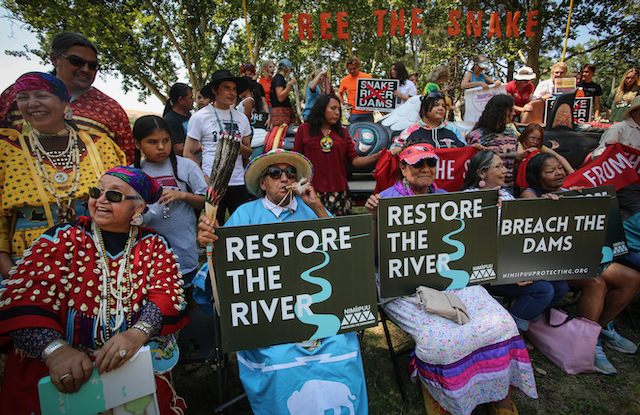Native Nations and Indigenous Peoples have been here since time immemorial. We stand together to protect our sacred places, medicines, burials, ancestors, cultural items, and ceremonial ways, and to ensure Indigenous voices and representation lead in these important matters pertaining to our rights, freedoms, and ways of life. These represent a sacred duty and traditional law, which are indigenous to these lands.
Governance
Indigenous people are the original conservationists. Our ancestors have passed down the ways that best protect our earth for generations. Tribes should be co-managers of our federal lands. It is an inherent right.
Native Organizers Alliance works to support the elevating of Tribal communities’ voices in the conservation and management of National Parks and public lands.
The “Tribal Homelands Initiative” from the Biden Administration commits to increasing opportunities for Tribal participation in federal lands management as well as co-stewardship agreements and other Tribal stewardship opportunities.
We must ensure that these processes and promises are carried out with the transparency and inclusion of Native voices and the unique needs of our various communities. The engagement should be comprehensive, meaningful, and respectful of each community’s traditional Indigenous knowledge. While many of the proposals that the Biden administration announced are moving in the right direction of structural reforms to restore the inherent rights of Tribal nations and Native communities to be full participants in decision-making, real change cannot be accomplished without free, prior, and informed consent from Tribes and Native communities.
NOA will continue to support and organize grassroots movements in order to defend these decisions in 2022 and beyond. These initiatives are direct responses to Native-led grassroots organizing and are vital steps toward transformational policy change.
Red Road to DC
In the summer of 2021, Native Organizers Alliance went on the road to accompany a totem pole from Lummi carvers and spiritual leaders on a cross-country tour connecting twenty of this continent’s most vital Native-led struggles where extractive industries mortally endanger sacred lands, waters, and species. The journey ended in Washington, D.C. where the totem pole was gifted to the Department of the Interior (DOI), in Washington, D.C., in a ceremony with DOI Secretary Deb Haaland and lifting up the voices of Tribal leadership and community organizers.
The Red Road to DC was a Native-led strategy to build on the momentum of tribal and Native communities to mobilize the U.S. public to relearn history and reckon with colonialism, structural racism, and the urgency of stopping deadly exploitation and abuse of the natural world. The Red Road to DC carried the hopes and prayers of Tribal and Native communities for the Biden-Harris administration to act on our collective ancestral responsibility to protect the sacred places and natural world.
Download the Red Road to DC Impact Report.


Tribal participation in federal lands management and co-stewardship
Since time immemorial, National Park lands have been home to many Tribal Nations who still consider the parks their ancestral homes. The parks have complex and often dark histories and for many Indigenous people, they represent the loss of traditional homelands and culture. Yellowstone and other national park lands were stolen from Tribal communities in often violent confrontations, causing them to be forcibly removed and displaced.
The true history of Native Americans and National Parks has long been erased from the national narrative, portraying the land as pristine and untouched. The focus on conservation has helped the general public to ignore the history of Native land dispossession in the name of preservation.
As original stewards of the land, it’s time to elevate the role of Native voices in the governance of National Parks. We need to move toward a future that includes more Tribal input and participation as it relates to National Parks and U.S. public lands. Federal agencies should incorporate Indigenous voices in the history and future of the National Parks.
Native Organizers Alliance is working with our network to help build national support around the movement for co-governance. Our support includes fundraising for local tribal efforts to elevate their community’s voice and calling on media outlets to help interrupt the narrative by highlighting the need for tribal input and participation.
Sacred Water Bundle Project
The Yankton Sioux tribe in South Dakota are developing a long-range project to define and understand water quality on their reservation, in partnership with the Center for Health, Environment and Justice. The tribe wants to develop a co-management plan for the Missouri River Bioregional watershed that will restore traditional Native practices of water and land management.
Native Organizers Alliance is partnering with the Brave Heart Society of the Yankton Sioux Tribe to support the creation of a new model of co-management of the Missouri River Basin. The model connects two core elements of transformational environmental justice organizing: the role of Native grassroots community and the potential power of tribal elected governments to exercise their sovereign right to co-manage the land, water and air in accordance with traditional teachings and values. The project is called, Mni Wizipan Wakan, the Sacred Water Bundle.
As part of Mni Wizipan Wakan, NOA is creating organizing trainings rooted in an understanding of relationality, kinship and other traditional practices. Strategic campaign planning and the trainings use popular education techniques to strengthen a theory of change premised on knowledge growing out of practice to strengthen and protect traditional culture while responding to 21st Century conditions.
Indigenizing the National Parks
March 2022 marked the 150th anniversary of Yellowstone National Park. Established in 1872, it’s the first National Park in the U.S., and one of the first in the world. However, as Indigenous people, we know that the legacy of the park’s land goes far beyond 150 years. Since time immemorial, the region has been home to many Tribal Nations who still consider Yellowstone their ancestral home. The National Parks have complex and often dark histories and for many Indigenous people, they represent the loss of traditional homelands and culture.
Now is the time for a national conversation around the governance of our National Parks and public lands. We are calling on our network to help build national support around the movement for co-governance and to Indigenize the National Park System. Federal agencies should incorporate Indigenous voices in the history and future of the National Parks.
Free, Prior & Informed Consent
Native Nations and Indigenous peoples need a seat at the decision-making table in matters dealing with our Tribal lands, water, and sacred places. In this era of examining racial injustice and climate change, the authority of Native Nations, traditional societies, ceremonial grounds, and Indigenous spiritual leaders must be recognized in these most important matters regarding the protection of sacred places and Indigenous ways of life.
With the ultimate goal of establishing free, prior, and informed consent as the foundational basis of federal relations with Indigenous Peoples, we encourage the current administration to take these important first steps.


